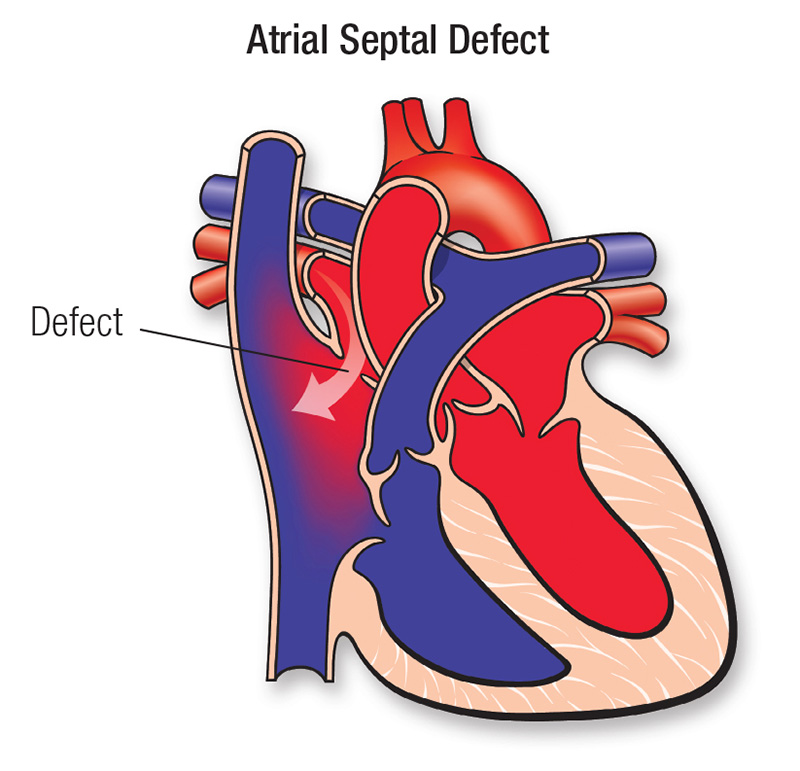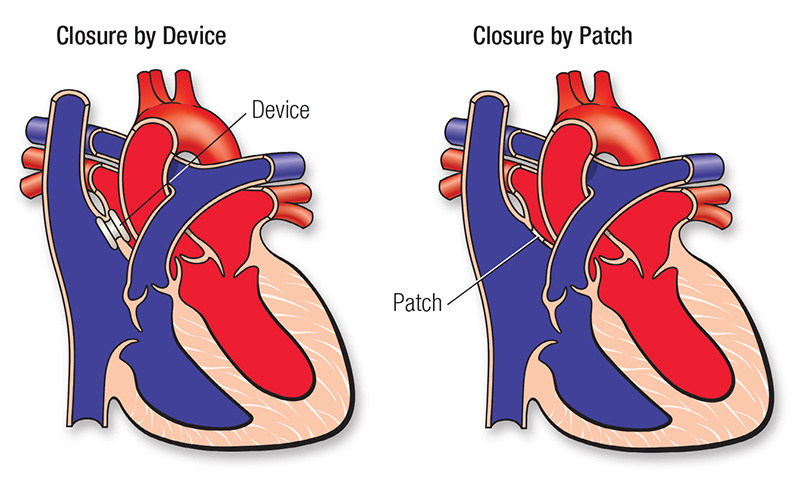Atrial Septal Defect
What is atrial septal defect (ASD)?
Some babies are born with a hole (defect) in the wall (septum) between the 2 top chambers of their heart (atria). This is called atrial (ay-TREE-ul) septal defect (ASD).
Normally, the heart works this way:
- The heart is made of 4 spaces, or chambers. The 2 on top are called atria, and the 2 on the bottom are ventricles.
- Your body parts use oxygen from your blood.
- The blue (oxygen-poor) blood returns to the right atrium.
- It goes down into the right ventricle and is pumped to the lungs, where it picks up oxygen.
- Red (oxygen-rich) blood returns from the lungs to the left atrium.
- It goes down into the left ventricle and is pumped out to the body.
 This is a healthy heart. The right atrium receives oxygen-poor blood from the body. The left atrium receives oxygen-rich blood from the lungs. The oxygen-poor and oxygen-rich blood do not mix in the heart.
This is a healthy heart. The right atrium receives oxygen-poor blood from the body. The left atrium receives oxygen-rich blood from the lungs. The oxygen-poor and oxygen-rich blood do not mix in the heart.When there is a hole in the septum between the atria, blood passes from the left atrium into the right atrium. With small holes, little blood passes through and your child doesn’t have symptoms.
With larger holes, more blood passes through. This makes the right side of the heart larger and can lead to other health problems over time.
 This is a heart with an ASD. The defect allows oxygen-rich and oxygen-poor blood to mix in the heart. From heart.org. ©2009, American Heart Association, Inc.
This is a heart with an ASD. The defect allows oxygen-rich and oxygen-poor blood to mix in the heart. From heart.org. ©2009, American Heart Association, Inc.What causes an ASD?
It is normal for babies to have a small hole, called the foramen ovale, between their atria while they are forming in the womb. Usually, this hole closes soon after birth.
Most of the time, it is not clear why an ASD happened. Children with certain genetic conditions, such as Down syndrome, are at increased risk for an ASD.
How common are ASDs?
ASD is a common heart defect. About 1 in every 1,900 babies born in the United States has an ASD.
Heart Center at Seattle Children's
What are the symptoms of ASD?
A small ASD may not cause any symptoms. A moderate or large defect may not cause symptoms until later in childhood or adulthood. A larger defect may cause symptoms soon after birth.
Symptoms may include:
- Tiring quickly when playing (exercise intolerance)
- Breathing fast or working hard to breathe (shortness of breath)
- Abnormal heartbeat (arrhythmia)
- Feeding problems
- Poor weight gain or slow growth (failure to thrive)
- Frequent lung (respiratory) infections, like pneumonia or bronchitis
Without treatment, large defects can increase the risk for heart or blood vessel problems later in life. These problems may include heart failure, stroke and higher pressure than normal in the blood vessels of the lungs (pulmonary hypertension).
How are ASDs diagnosed?
To diagnose this condition, your child’s doctor will examine them and listen to their heart. In children with ASD, doctors can often hear an abnormal heart sound or heart murmur — a noise caused by excess blood flow to the lungs.
The doctor will ask for details about your child’s symptoms, their health history and your family health history.
To get more information about your child’s heart, the doctor may ask for tests, including:
- Echocardiogram
- Electrocardiogram (ECG or EKG)
- MRI (magnetic resonance imaging) of the heart
How are ASDs treated?
Your child may not need treatment for ASD. In some children, it does not cause any problems. If the hole is small, it may close on its own as your child grows. In this case, your child’s doctor may simply recommend checking your child’s condition over time.
Some children need treatment because of the size of the defect, its effect on the heart or the symptoms it causes. There are 2 options: cardiac catheterization and surgery. Usually, we treat children between the ages of 3 and 5 years old, before they have any symptoms. Sometimes, we treat children earlier, even as babies.
Cardiac catheterization
Some ASDs are treated with a device that covers the hole in the septum. Doctors place the device using a long, thin tube (catheter). They insert the tube through a large blood vessel in the groin and thread it up to the heart. This procedure is a cardiac catheterization.
Surgery
 From heart.org. ©2009, American Heart Association, Inc.
From heart.org. ©2009, American Heart Association, Inc.The size and position of the defect are important in choosing the mode of treatment. If the defect is large and close to a heart valve, doctors may not be able to cover it using a device. Instead, your child may need surgery to close the hole with stitches (sutures) or a patch.
Why choose Seattle Children’s for ASD treatment?
-
The experts you need are here
- The Heart Center team includes more than 40 pediatric cardiologists who diagnose and treat every kind of heart problem, including atrial septal defects.
- Our doctors and surgeons are experts in the therapies your child may need. These include using cardiac catheterization to place a device that closes the hole in the septum or doing surgery to close the hole.
- The results of our surgeries (outcomes) are among the best in the nation year after year. See our outcomes for atrial septal defect repair.
- We also have a pediatric cardiac anesthesia team and a Cardiac Intensive Care Unit ready to care for children who have heart surgery. General anesthesia is a medicine we give before surgery so your child is fully asleep during the procedure.
- Your child’s team includes other experts from Seattle Children’s based on their needs, like neonatologists or pulmonologists.
-
Care from before birth through young adulthood
- Your child’s treatment plan is custom-made. We plan and carry out their treatment based on the specific details of their heart defect. We closely check your child’s needs to make sure they get the care that is right for them at every age.
- We have a special Adult Congenital Heart Disease Program to meet your child’s long-term healthcare needs. This program, shared with the University of Washington, transitions your child to adult care when they are ready.
-
Support for your whole family
- We are committed to your child’s overall health and well-being and to helping your child live a full and active life.
- Whatever types of care your child needs, we will help your family through this experience. We will discuss your child’s condition and treatment options in ways you understand and involve you in every decision.
- Our Child Life specialists know how to help children understand their illnesses and treatments in ways that make sense for their age.
- Seattle Children’s has many resources, from financial to spiritual, to support your child and your family and make your experience as smooth as possible.
- Many children and families travel to Seattle Children’s for heart surgery or other care. We help you coordinate travel and housing so you can stay focused on your child.
Read more about the supportive care we offer.
-
Advancing treatment for children
- Seattle Children’s doctors take part in national and international studies testing new methods and devices to close ASDs in children who need treatment.
- We focus on getting the best possible results for children. Our research on cardiac catheterization has helped shorten recovery times and lessen long-term side effects.
Contact Us
Contact the Heart Center at 206-987-2515 for an appointment, second opinion or more information.
Providers, see how to refer a patient.
Related Links
Paying for Care
Learn about paying for care at Seattle Children’s, including coverage, billing and financial assistance.

